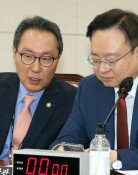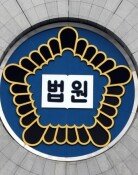Arrest does not mean a guilty verdict
Arrest does not mean a guilty verdict
Posted May. 01, 2017 07:26,
Updated May. 01, 2017 07:49
It turns out that about 10.1 percent of the cases prosecutors arrested and charged with power-related corruptions have not been found not guilty. The JoongAng Sunday newspaper traced and analyzed 119 decisions of the Supreme Court of which rulings were finalized among the accused for major power-related corruption cases indicted by the Supreme Public Prosecutors’ Office since 2000 and the Seoul Central District Public Prosecutors’ Office or special investigation headquarters after the dismantlement of the central investigation department in 2013. The result suggests that 12 persons were found not guilty and the number surpassed 2.3 percent of court settlement for criminal cases during the same period. Main reasons were that prosecutors failed to prove the accused guilty or provide sufficient evidence for corruption.
Notable examples are Hwang Ki-chul, former naval chief, and Lee Cheol-gyu, former head of Gyeonggi Provincial Police Agency (current lawmaker of Free Korea Party). Mr. Hwang was arrested and indicted in 2015 for alleged involvement in fabricating test result of SONAR with poor performance to deliver it to the Tongyeong salvage and rescue ship when he was leading the naval ship business team of the Defense Acquisition Program Administration in 2009. He had been found not guilty in the first and second trials, and the Supreme Court declared him innocent last year. Mr. Lee was arrested on charges of receiving bribery from the chairman of the Jeil Savings Bank in 2012. The Supreme Court also found him not guilty in 2013 as same with the rulings by the lower courts.
In Japanese movie titled "I just didn’t do it (2007)," the defense attorney advised the main character, who was arrested after being mistaken for a sex offender in the subway, to plead guilty and to be fined as chances of being found guilty are 99.9 percent once he was indicted. The 99.9 percent does not exist only in the movies. It is an actual number of receiving a verdict of guilty for criminal cases in Japan including both cases of arrest and without arrest. Thus, a chance of being found not guilty is almost zero percent if the accused was arrested and indicated.
When we say that at least one out of 10 persons is found not guilty when they are arrested and indicted, it means that prosecutors file for arrest warrants that do not need to be applied. In other words, it means that there are many cases that prosecutors apply for arrest warrants for their convenience regardless of the requirements of arrest such as concerns of escape and the destruction of evidence or as an expression of punishment due to media and political pressure, although such cases are greatly open to be argued in the court. Prosecutors’ seeking arrest does not naturally constitute the guilty. We should not accept such argument. Also, the court needs to be more cautious to issue an arrest warrant.
yuri@donga.com
Headline News
- Israel prepares for retaliation against Iran
- Samsung reclaims top spot, surpassing Apple in smartphone market
- 77% of Koreans in 20s and 30s are 'Kangaroo Tribe' due to job crisis
- KBO referees embroiled in controversy over ABS decision concealment
- Inflation, oil price surge put double shock on global economy







